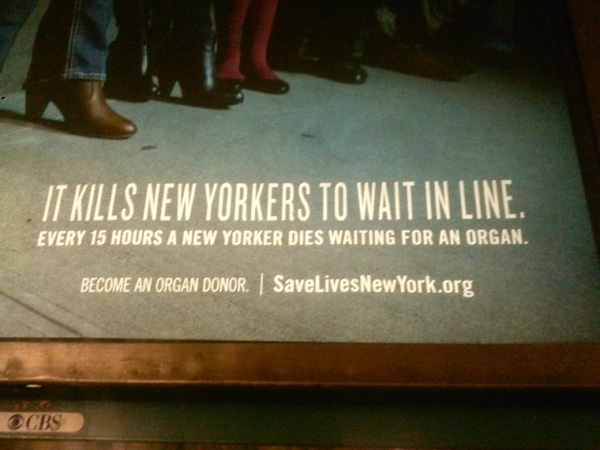Ambiguity watch: failing families, killing New Yorkers
« previous post | next post »
Here are two items of ambiguity in advertising, one intentional and one not. First the apparently unintentional ambiguity: a new commercial from the Romney presidential campaign entitled "Failing American Families."
As the terse voiceover puts it, “Barack Obama. More spending. More debt. Failing American Families.”
The telegraphic style is responsible for the ambiguity here. You could begin to fill in the elliptical gaps with something like: "Barack Obama [is responsible for] more spending [and] more debt." That might lead you to construe the third item as another noun phrase, denoting something else for which Obama is responsible.
But "failing American families" is not intended to be read as a NP meaning "American families that are failing," along the lines of "failing businesses." Rather, it's a predicate with deleted copula: "Barack Obama [is] failing American families," with "fail" as a transitive verb meaning "to let down" or "to disappoint." News reports fill in the gap: the National Journal, for instance, gives the message as "President Obama is 'failing' American families on spending and the national debt." The battling interpretations of "failing American families" are reminiscent of such chestnuts from intro linguistics classes as "I hate visiting relatives." (See my 2006 post, "Surprising crocodile kin," for more.)
The second ambiguity is a more strategic one, in the form of a public-service message for organ donation. Paul Ellis sends along this photograph, snapped on on a New York City subway:
Let's leave aside the fact that, as Paul points out, New Yorkers wait on line, not in line. The message gets its punch by seeming to use a metaphorical sense of "kill," meaning something like "to cause distress": it distresses New Yorkers to have to wait in/on line. But the kicker is that "kill" is meant literally: waiting in line (for a donated organ) actually kills New Yorkers.
For more on how ambiguity of the intentional variety gets deployed in advertising, see Nancy Friedman's Visual Thesaurus column, "The Power of Ambiguity."

Rod Johnson said,
September 17, 2012 @ 11:15 pm
Failing families can be dangerous.
Jon Weinberg said,
September 18, 2012 @ 6:30 am
But had the public-service message said "on line", that would have created an additional, unwanted ambiguity. So it was better to go with "in line" (a locution New Yorkers, in any event, are familiar with — check out all those green dots on the dialect survey). I grew up in New York, and I stand on line, but I know what "in line" means.
Rodger C said,
September 18, 2012 @ 7:27 am
Academics in my disciplinary vicinity are fond of using the first construction in titles like "Controlling Women" and "Murdering Savages."
Mr Punch said,
September 18, 2012 @ 7:35 am
Governor Romney's comments about "dependent"Americans, it seems to me, suggest that the ambiguity of the first example may have been calculated.
TranslationGuy said,
September 18, 2012 @ 8:43 am
Here in NYC we wait on line only when we are waiting for a page to load on the Internet. We wait in line everywhere else. It's what we say, not what you say we should say.
Rodger C said,
September 18, 2012 @ 9:42 am
Perhaps the language of NYC has changed in the past generation. < the Bee Gees?
Stitch said,
September 18, 2012 @ 12:30 pm
"EVERY 15 HOURS A NEW YORKER DIES WAITING FOR AN ORGAN"
Now there's an annoying cliche for you. I'm trying hard not to say, "Wow, I'd hate to be that person!"
[(bgz) Reminiscent of the old Saturday Night Live sketch: "In New York, a man is mugged every 11 seconds. I would now like you to meet that man."]
Dave said,
September 18, 2012 @ 1:50 pm
Here in Portland, where we had a couple of mayors named Failing, there was a school named after them, the Failing School, which despite having closed some decades ago still seems to turn up in national headlines pretty often.
Mike G said,
September 20, 2012 @ 10:19 am
And, of course, there's the whole other layer of (less lofty) ambiguity introduced by the polysemy of "organ":
Does it matter whether the organs to be donated are of the electric or pipe variety? I assume that "mouth organs" are right out.
Ed said,
October 10, 2012 @ 10:42 am
very late to comment on this post…but i think the "in line" use was necessary to get the ambiguity, regardless of regional preference, because "on line" is only used for physically queuing. i'm not a native "on line"-er, but i'm pretty sure those who are don't say things like the Secretary of State is fourth on line to succeed the President. people waiting for organ transplants are in similar, abstract lines.
Chad said,
March 6, 2014 @ 5:32 pm
I see nothing wrong with the "in line" usage.